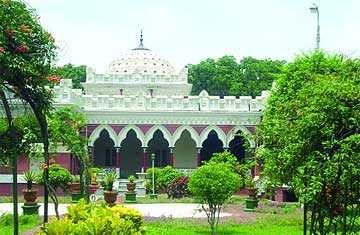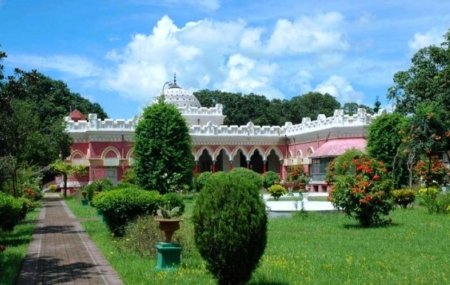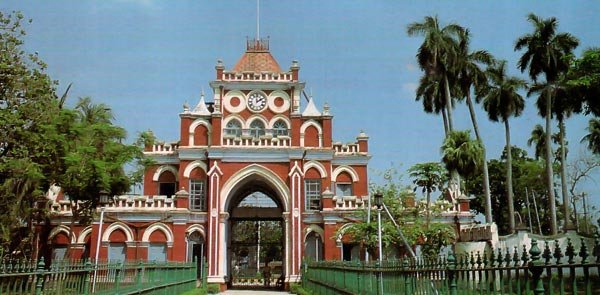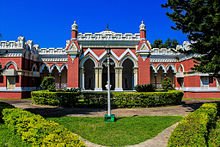Natore is a word of about 300 years old city filled with history and tradition...
Natore is a word of about 300 years old city filled with history and tradition.

The Dighapatia palace is a sign of ancient architecture. The beauty of this 300-year old history and heritage is now known throughout the country as the Uttara Ganobhaban name in the Dighapatia union of the suburbs.

King Daraam Roy was the founder of Dighapatia dynasty. In 1734, the Dighapatiya royal palace was built in the year 1734 by Daraam Roy, in which he received the land to live as a gift from King Ramjivan. During the reign of Pramdanath Ray, the sixth king of the dynasty, on 10 June 1897, a session of the three-day Bengal Provincial Congress was held at Dompara ground in Natore. Many elite people, including Rabindranath Tagore, joined the session as invited guests in this session.
.jpg)
When the palace was nearly destroyed in 1897, the King Pramdanath Roy rebuilt the Rajbari. The kingdoms of Dighapatia dynasty ruled the state from 1710 to 1947. Among those who still remain immortal on the history page are King Daraam Roy, Jagannath Roy, Prannath Roy, Prasannnath Roy, Pramathnath Roy, Pramdanath Roy, Prativanath Roy and the last king of the eighth and the last king of the family, Pratatnath Roy.
.jpg)
There are 12 buildings in Rajbari. These are the main palace buildings, Kumar Palace, main kachari building, three authority houses, main gate kitchen, motor garage, driver quarters, staff quarter, treasury building and centri box. The doors and windows of the main building and other buildings, all made of precious wood. In the south of the palace there are stone gardens with stone and marble stones. The garden is known as Italy Garden. In the garden there are many varieties of native and foreign varieties of rare flower trees.

Four stone statues of white stones brought from Italy in the garden still reach the heart of the tourists. The main palace of the Rajbari is one-storied. It has a spacious spa. There are two cannons made by the British in 1854. The King's Swing Stage is on the east side of the main palace ground. Next to the Kumar Palace. A four-wheeled black cannon placed in front of it is still shining.
.jpg)
On the entrance of the main palace, two black blacksmiths on either side of the stairs Next is the Metallic Armor. It was soon after the king used to go to war. That is why the brass made armor still has special attention to visitors. The king's power plant was on the north side of the palace. In the eighteenth century, the Rajbari light shone from the electricity produced from there. There is a big clock in the Rajabari's main gate. There are two dials on both sides.

The clock is still giving the right time. This watch was brought from Florence in Italy. The magnificent clock bell at the top of the main gate was heard from 10-12 miles away. Now it is heard from just a few miles away. During the War of Liberation, Dighapatiya Rajbari was taken as a camp for Pak army and they took other valuable assets including Gharas. From 1917 to 1947, seven kings of the kingdom of Dighapatia have been immortal in history through their state rule and development work. During the time of the founder of the kingdom King Dayaram, extensive development was achieved. In the year 1829 during the reign of Prasannnath Roy, there was a subdivision of Natore.

From Rajshahi to Natore, the Rajpath was extended to Dighapatia and connected to Bogra road. In 1950, the bank gave Tk 35,000 to the government for the reform of the road. In 1851, the first ever Natore Charity Hospital, which was transformed into today's modern Sadar Hospital, was established. At that time, Europe's medicines and equipment were provided free of charge. After the death of King Prasannanath Roy in 1853, Rajshahi Charitable Doctorate was established in the sense of his donation. Later this was the Rajshahi Sadar Hospital. Prasannnath Academy created Natore Raj in 1852. This is the first high school in Natore.
.jpg)
In addition, for the Dighapatia High School, Natore and Rajshahi Hospital, King Prasannnath Roy gave one lakh rupees in 1852. He developed the Dighapatia Rajbari in a modern way. During the reign of the fifth king Prasannanath Roy, the state expanded. He was the wealthiest zamindar of Rajshahi district. In 1868 Rajshahi Girls School was established. Established a charitable dispensary and a secondary school in Naokhila, Bogra. In 1882, it became a high school.
.jpg)
In 1877, Prasannanath Roy was nominated a member of the Bengal Legislative Assembly. Many attempts were passed in his efforts. After the assumption of power, Pramdanath Roy, the sixth King of this dynasty, took various welfare activities after taking office on 29 January. Of them, in the Rajshahi Medical College, 7 thousand rupees and Lady Duffuron Fund donated Tk 20 thousand. Construction of a mosque in Naokhila. After the partition of India in 1947, Dighapatiya Raja left the country and went to India.

After the acquisition of the zamindari acquisition and tenancy act in 1950, there was a lot of problem in the maintenance of the royal palace of Dighapatiya. In 1966, the Raj Bhavan was turned into East Pakistan House. On July 24, 1967, the Governor of Monayem Khan converted it into the governor's house. After independence Bangabandhu Sheikh Mujibur Rahman declared it Uttara Ganobhaban. Ziaur Rahman, Begum Khaleda Zia, Ershad and Sheikh Hasina held a cabinet meeting in the Rajbari by keeping that continuity. The glory of Dighapatia Rajbari is no more. Although the Ganabhaban, the Rajbari is now only as a crocodile state guest house.